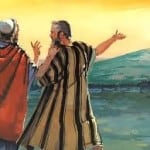Rabbi Chanan Morisson
“And [the spies] began to speak badly about the land that they had explored.” (Num. 13:32)
A dispirited discussion took place at Beit HaRav, Rav Kook’s house in Jerusalem, not long after the end of World War II. The Chief Rabbi had passed away ten years earlier; now it was his son, Rabbi Tzvi Yehudah Kook, who sat at the head of the table.
One participant at the Sabbath table had brought up a disturbing topic: the phenomenon of visitors touring Eretz Yisrael and then criticizing the country after returning to their homes. These visitors complain about everything: the heat, the poverty, the backwardness, the political situation – and discourage other Jews from moving here, he lamented.
Rav Tzvi Yehudah responded by telling over the following parable, one he had heard in the name of Rabbi Samuel Mohilever, the rabbi of Bialystok.
The Failed Match
There was once a wealthy man who sought the hand of a certain young lady. She was the most beautiful girl in town, and was blessed with many talents and a truly refined character. Her family was not well-off, so they were eager about a possible match with the prosperous fellow.
The young woman, however, was not interested in the match. Rich or not, the prospective suitor was known to be coarse and ill-mannered. She refused to meet with him.
The father asked her to at least meet with the young man in their home, so as not to embarrass him. After all, one meeting doesn’t obligate you to marry him! To please her father, the young woman agreed.
The following Sabbath afternoon, the fellow arrived at the house as arranged, and was warmly received by the father. Shortly afterwards, his daughter made her entrance. But her hair was uncombed, and she wore a faded, crumpled dress and shabby house slippers. Appalled at her disheveled appearance, it did not take long before the young man excused himself and made a hurried exit.
What everyone says about this girl – it’s not true, exclaimed the astonished young man to his friends. She’s hideous!
Rav Tzvi Yehudah stopped briefly, surveying the guests seated around the table. Superficially, it would appear that the brash young fellow had rejected the young woman. But in fact, it was she who had rejected him.
The same is true regarding the Land of Israel, the rabbi explained. Eretz Yisrael is a special land, only ready to accept those who are receptive to its unique spiritual qualities. The Land does not reveal its inner beauty to all who visit. Not everyone is worthy to perceive its special holiness.
It may appear as if the dissatisfied visitors are the ones who reject the Land of Israel, he concluded. But in fact, it is the Land that rejects them!
A thoughtful silence pervaded the room. Those present were stunned by the parable and the rabbi’s impassioned delivery. Then one of the guests observed, Reb Tzvi Yehudah, your words are suitable for a son of your eminent father, may his memory be a blessing!
Seeing the Goodness of Jerusalem
Rav Tzvi Yehudah’s response was indeed appropriate for Rav Kook’s son. When visitors from outside the country would approach the Chief Rabbi for a blessing, Rav Kook would quote from the Book of Psalms, “May God bless you from Zion” (128:5).
Then he would ask: What exactly is this blessing from Zion? In fact, the content of the blessing is described in the continuation of the verse: “May you see the goodness of Jerusalem.”
The rabbi would explain: The verse does not say that one should merit seeing Jerusalem; but that one should merit seeing ‘the goodness of Jerusalem.’ Many people visit Jerusalem. But how many of them merit seeing the inner goodness hidden in the holy city?
And that, he concluded, is God’s special blessing from Zion.

(Stories from the Land of Israel. Adapted from Malachim Kivnei Adam, pp. 227-278, 230)

As always, Shorashim provides the most insightful blessings (“the inner goodness”) from Jerusalem. Thank you, Moshe & Dov.
Thank you for this insight. Israel is a good and spacious Land. We will return to the States in a few days, and just as Kalev and Yhoshua, we will make the proclamation that “the Land we passed through…is an outstandingly good Land (B’midbar 14:7). Thank you Moshe for all of your words of encouragement to us during the 35 days we have been in the Land…The Land of Israel is living and breathing and will always be a part of us.